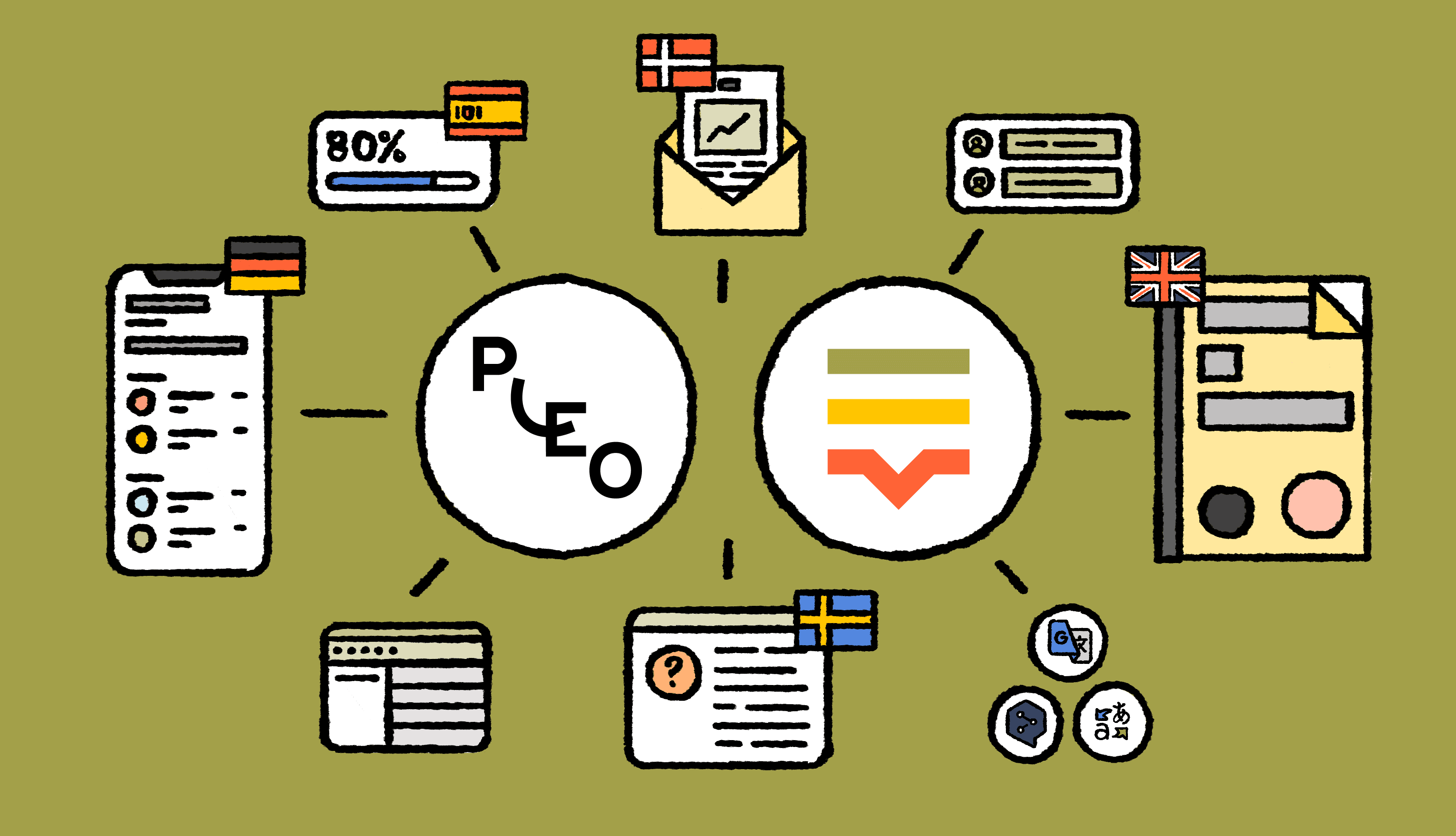The problem that Pleo solves
Before we dive into the nuts and bolts of localization at Pleo, let’s take a closer look at the problem that Pleo solves. Here’s how Neil put it:
“Our smart company cards and spend management software make it easy to track and pay expenses, invoices, subscriptions, and more. Using Pleo means that whatever people need to buy to do their best work, there’s no red tape or manual processes to hold them back.”
So, in a nutshell – Pleo transforms financial processes that are tedious, time-consuming, and make people feel less valued than they should at work.
As Neil shared with us, one of their customers summed it up nicely: having to ask the boss for the credit card to buy something you need to do your job is like asking your parents for pocket money to go to the movies.
Why is Pleo so ambitious on the localization front?
Pleo understands the value of fintech localization that goes beyond simply translating content. In fintech, it’s not just about building a personalized customer experience.
It’s necessary to obtain deep knowledge of restrictions and regulations in different markets so that the company can comply with all legal requirements and ensure a successful product geo-fit.
Neil shares how they want to ensure that all their customers have authentic experiences when interacting with Pleo:
“We’re ambitious in what we want to offer to each market, in terms of a localized experience. When they use the Pleo app, when they read a blog post, when they download our latest ebook – we want to offer “more than expected”, which is the meaning of Pleo in Ancient Greek… or so the story goes!”
When it comes to how they actually handle localization, we couldn’t avoid the “in-house vs. outsourced localization” discussion.
In Pleo’s case, it seems that the growth in employee numbers helped them take more ownership and effectively collaborate across the border with different team members – internally. The result? A truly personalized Pleo experience for each market:
“As we’ve grown, we’ve taken more of the localization in-house – we’re very lucky to have added talented marketing managers for each of our markets now, who help to lead our efforts. They work closely with linguists – some permanent, some freelance, all very talented and trusted to take the Pleo tone of voice and make it sing in their own language.”
[Struggling with fintech localization? Download our ebook.]
What does Pleo localize?
Pleo’s primary focus is to accurately localize their app while ensuring great UX and preserving their unique tone of voice. In addition, they localize educational and thought-provoking content they know their audience loves, shared Neil:
“At an exciting scale-up like Pleo, there are a million things we could be pursuing at any one time. Do we focus on ebooks, or on improving our customer help center, or record some cool customer story videos?
Now think about all that in each market. They’ve got these cool initiatives coming from our core team, but they also, understandably, have their own things they want to work on."
Neil then added:
"It’s not easy! But with tools like Lokalise, it becomes a whole lot easier."
Localizing content
Each of the markets where Pleo is present has a very talented Marketing Manager who fundamentally leads the charge on what assets are localized, says Neil:
“They look at the blogs, ebooks, newsletters or website projects that the content team produces in English and make a call about what they need for their market. We have Notion boards that offer a good roadmap of the content and assets currently in the works, although in a fast-paced scale-up, there are always a few surprise projects that crop up.
We empower and encourage those local teams (Marketing Managers and local Content Producers) to adapt our English language content in the way they see fit.”
Of course, it’s important to bear in mind all the nuances of different markets:
“There’s absolutely no reason why something written with a British business audience in mind would also appeal to a German business audience. A CFO in Spain will be similar to a CFO in Denmark of course, in terms of their skills and priorities, but not quite identical.”
Localizing the Pleo app + the brand itself
There are some differences between what Pleo software can do in each market, so they work hard to ensure that, for instance, their newsletter in Spain doesn’t talk about features that are only available in the UK and Ireland. Here’s what Neil shared with us:
“There’s a playfulness to the Pleo brand and product that we know customers enjoy. But at the end of the day, we’re dealing with money and it’s important to be clear in any communication with people. If someone is using the app in their native language and were to discover some text that left them confused, it’s not a great reflection on us.”
However, Lokalise has been a great tool in helping Pleo ensure that they’ve been really thorough in spotting those potential issues and taking care of them before they cause any problems.
How Lokalise helps Pleo
“Lokalise helped us to bring order to what can be a chaotic process, especially for a company growing as fast as we are,” says Neil.
He explains that there are two things at play, at least from his perspective:
“One is the external situation: We’re working across several European markets with their own languages, processes, and product elements. We want to localize Pleo well, and do it quickly, for our customers (and future customers!) in those markets.
And then internally: As a company, we’ve got a big focus on collaboration and transparency. But it’s rare (especially over the past year) to be in the same room as people from your own team, let alone another team!”
With such ambitions, it was important to have reliable and secure localization software that enables efficient cross-team collaboration:
“We needed a tool that gave us the best chance to make an impact in those non-English markets, but in a way that was built around collaboration.
Lokalise has done a great job on that front so far. Different teams, working on different schedules, can come together with a clear idea of the work that needs to be done. With Lokalise, they can just get stuck in and not get tangled up in endless Slack conversations or inefficient methods of translating the vital bits of copy.”
For product teams and linguists alike
The collaborative nature of Lokalise makes it suitable for both product teams and linguists alike. Neil said that their product team wants to ensure that Pleo is well received around the globe:
“Our product team have spent their lives building a great spending solution and are ambitious to see Pleo spread far and wide across the world. It’s fantastic for them to know that the product is going to really shine in every available language.
Imagine you spend hour upon hour developing this wonderful software, only to hear that it’s not doing what it should for our customers because of some dodgy translations or missed lines of copy. That’d be heartbreaking!”
Neil also talked with Pleo’s linguists to gather honest feedback about Lokalise and here’s what they had to say:
“The best thing about Lokalise is the UX. Translating is very simple and visual, and you can also track your progress in a truly easy way."
"The multilingual view (both for projects and strings) is very useful when working with different markets. It’s also good for inspiration to check how other colleagues have translated certain strings.
Also, the project chat is a good way to get clarifications when needed without using email or an external chat (i.e., with product managers). The automated machine translation integration (Google, DeepL and Microsoft) is really useful to get inspiration.
In addition to the above points, in my experience with Pleo, I have found it very helpful that Lokalise saves the previous translations of a term/sentence. It’s perfect to maintain consistency if you are working on a product that is being constantly updated.”
[Curious about how Lokalise helps other team members? Find out why designers, developers, and localization managers like working with Lokalise, too.]
Great fintech localization = great customer experiences
In fintech, building relevant customer experiences is imperative and localization is a huge part of it. Pleo is well aware of this fact:
“A fast-growing company wants to offer a fantastic customer experience in every market. It’s very difficult to do that well if your various teams can’t collaborate easily and quickly.
So much of our early success at Pleo was built on going the extra mile to understand and serve our customers. Localization is a key part of that for the stage of growth we’re at. Any tool that helps us solve the problems involved in that process is very welcome. Lokalise fit the bill perfectly.”
-
We want to thank Neil for this awesome talk, and we’re excited to see the teams make Pleo more accessible and bring power back to the people! Because let’s face it – managing your team’s expenses shouldn’t be hard, regardless of where your business is located.
If you’re curious to find out why Lokalise is the preferred localization software of growth-oriented fintech companies, check out this page.



